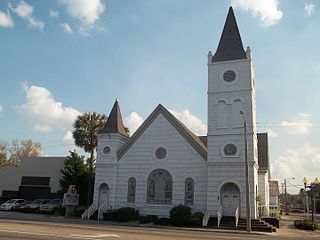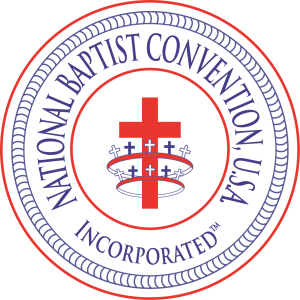Related Research Articles

Buncombe County is a county located in the U.S. state of North Carolina. It is classified within Western North Carolina. The 2020 Census reported the population was 269,452. Its county seat is Asheville. Buncombe County is part of the Asheville, NC Metropolitan Statistical Area.

Trussville is a city in Jefferson and St. Clair counties in the State of Alabama. It is a suburb of Birmingham and part of the Birmingham-Hoover Metropolitan Statistical Area. Its population at the 2020 census was 26,123.

The Southern Baptist Convention (SBC) is a Christian denomination based in the United States. It is the world's largest Baptist denomination, and the largest Protestant and second-largest Christian denomination in the United States. The word Southern in "Southern Baptist Convention" stems from its having been organized in 1845 in Augusta, Georgia, by Baptists in the Southern United States who split from the northern Baptists over the issue of African-American enslavement; citing biblical texts, the SBC strongly opposed its abolition.

The African Methodist Episcopal Church, usually called the AME Church or AME, is a predominantly African-American Methodist denomination. It adheres to Wesleyan-Arminian theology and has a connexional polity. The African Methodist Episcopal Church is the first independent Protestant denomination to be founded by black people, though it welcomes and has members of all ethnicities. It was founded by Richard Allen (1760–1831) - later elected and ordained first bishop in Philadelphia, Pennsylvania, in 1816 from calling together of five black congregations of the earlier established Methodist Episcopal Church on the East Coast / Middle-Atlantic states area in the first General Conference, who wanted to escape the discrimination that was commonplace in society. It was among the first denominations in the United States to be founded for this reason, rather than for theological distinctions, and has persistently advocated for the civil and human rights of African Americans through social improvement, religious autonomy, and political engagement, while always being open to people of all racial backgrounds. Allen, an previously ordained Deacon in the Methodist Episcopal Church, was elected by the gathered ministers and ordained / consecrated as its first bishop in 1816 by the first General Conference of the five churches - extending from the three in the Philadelphia area in Pennsylvania to one in Delaware and one in Maryland of Baltimore. The denomination then expanded west and through the South, particularly after the American Civil War (1861–1865). By 1906, the AME had a membership of about 500,000, more than the combined total of the two other predominantly Black American denominations - the Colored Methodist Episcopal Church in America and the African Methodist Episcopal Zion Church, making it the largest major African-American denomination of the Methodist traditions.

The black church is the faith and body of Christian congregations and denominations in the United States that minister predominantly to African Americans, as well as their collective traditions and members. The term "black church" can also refer to individual congregations.

Religion of black Americans refers to the religious and spiritual practices of African Americans. Historians generally agree that the religious life of black Americans "forms the foundation of their community life". Before 1775 there was scattered evidence of organized religion among black people in the Thirteen Colonies. The Methodist and Baptist churches became much more active in the 1780s. Their growth was quite rapid for the next 150 years, until their membership included the majority of black Americans.
Gardner Calvin Taylor was an American Baptist preacher. He was admired for his eloquence as well as his understanding of Christian faith and theology. He became known as "the dean of American preaching". He learned the art of preaching from his mentor and teacher Reverend Dr. BG Crawley.
Paul Sylvester Morton is an American Baptist pastor. He is the senior pastor of Changing a Generation Full Gospel Baptist Church in Atlanta, Georgia, and co-pastor of Greater St. Stephen Full Gospel Baptist Church in New Orleans, Louisiana. He is also a recording artist, author, and founder of the Full Gospel Baptist Church Fellowship, International.
The history of the Baptist movement in the state of Alabama predates Alabama statehood.
Hosea Lot Holcombe (1780–1841) was Alabama's first church historian, as noted on his marker in Bessemer, Alabama. He was a Baptist evangelist and missionary, who moved from the Carolinas to Alabama in 1818. He was President of the Alabama Baptist Convention from 1833 to 1838. Asked to write a history of the church, he traveled throughout the state collecting material for his History of Rise and Progress of the Baptists in Alabama, published in 1840 a year before his death.
Alexander Travis was a Baptist preacher and a prominent member of the Alabama Baptist State Convention. His nephew William Barret Travis was Texas commander at the Battle of the Alamo in 1836.

The National Baptist Convention, USA, Inc., more commonly known as the National Baptist Convention, is a primarily African American Baptist Christian denomination in the United States. It is headquartered at the Baptist World Center in Nashville, Tennessee and affiliated with the Baptist World Alliance. It is also the largest predominantly Black Christian denomination in the United States and the second largest Baptist denomination in the world.

The Antioch Baptist Church in Mount Meigs, Alabama was founded in 1818 and is the first Baptist church in the county. Originally a rural white church, from 1849 until the Civil War it was a biracial church; since then, the church has moved and has become an African-American church. The old church site now has only a graveyard, the Antioch Cemetery.
Caesar Blackwell (1769–1845) was an enslaved African-American preacher in Alabama, one of a number of black preachers in the South who preached to a mixed congregation. He was either bought or freed by the Alabama Baptist Association, and preached in the Antioch Baptist Church in Montgomery County, Alabama.

James H. DeVotie (1814–1891) was a Baptist minister in the American South. Born in Oneida County, New York, he was a pastor in South Carolina, Alabama and Georgia. He was a co-founder of Howard College in Marion, Alabama, later known as Samford University near Birmingham. He was a long-time trustee of Mercer University in Macon, Georgia. He served as a Confederate chaplain during the Civil War. After the war, he worked for the Southern Baptist Convention.
Francis Hews was a Baptist preacher. He was known for his work in Bedfordshire, England, and for the account he gave in his autobiography, Spoils Won in the Day of Battle (1798), of the opposition he received to his activities which, he claimed, included threats of murder.
William Tennent III was a Presbyterian pastor and South Carolina politician. He was born and educated in northern Colonial America, but spent the latter part of his life in the southern state of South Carolina. He was a prominent advocate for the dis-establishment of any state religion. He is known for his opposition to British colonial policy, publishing patriotic essays in support of the revolution. He was selected to travel in 1775 into the "back county" of South Carolina to convert Loyalists to the cause. In the state assembly, he lobbied for religious liberty in the drafting of state constitutions.

George Washington Baines was an American frontier politician, editor, teacher, and Baptist preacher in Texas; he was also president and co-founder of Baylor University.
References
- 1 2 3 4 5 6 "Sion Blythe" (PDF). Primitive Baptist Online. Retrieved 2010-08-29.
- ↑ "Selected Families and Individuals". Earl Jones. Retrieved 2010-08-29.
- ↑ David Benedict (1813). "NORTH-CAROLINA". A GENERAL HISTORY OF THE BAPTIST DENOMINATION IN AMERICA, AND OTHER PARTS OF THE WORLD. Lincoln & Edmands. Retrieved 2010-08-29.
- ↑ Hosea Holcombe (1840). A history of the rise and progress of the Baptists in Alabama: with a miniature history of the denomination from the apostolic age down to the present time, interspersed with anecdotes original and selected, and concluded with an address to the Baptists of Alabama. King and Baird. p. 52.
- ↑ "Historical Marker Program: St. Clair County". Alabama Historical Asspociation. Retrieved 2010-08-29.
- ↑ "Quick Facts". First Baptist Church Trussville. Archived from the original on May 31, 2010. Retrieved 2010-08-29.
- ↑ Wayne Flynt (1998). Alabama Baptists: Southern Baptists in the heart of Dixie. University of Alabama Press. p. 27. ISBN 0-8173-0927-6.
- ↑ "Chesley Turnbow". U.S. Biographies Project. Retrieved 2010-08-29.